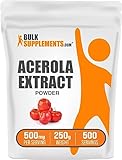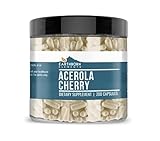Table of Contents

Acerola benefits: When the Spaniards first arrived in the Caribbean Islands in the 16th century, they found a tree with fruit similar to the azarole cultivated in Europe. They named it Acerola. Those explorers had no idea then that the Caribbean acerola cherry is much richer in vitamin C than the European fruit.
Azarole is a fruit of a bush or tree of the botanical family Rosaceae (Crataegus azarolus L.). It is similar to the cherry, and as the acerola described here, it is very rich in vitamin C (275 mg/100 g).
Scientific Facts
Acerola Related Species: Malpighia punicifolia L.
- Synonyms: Spanish pine, Neapolitan medlar
- French: Angerolle, angerolier
- Spanish: Acerola
- German: Acerola-kirsche
- Description: Fruit of ‘Malpighia glabra’ L., a tree of the botanical family Malpighiaceae
- Habitat: The acerola is native to the Caribbean region. Today, it is found throughout Central America, from Mexico to Venezuela.
- Earthborn Elements Acerola Cherry Powder in a resealable bucket
- Acerola Cherry is a natural source of Vitamin C
- Acerola Cherry is native to Brazil, Central America, Mexico & Paraguay
- Pure & Undiluted: Never any additives or fillers
- Packaged in USA
Acerola Benefits: Medicinal Properties and Indication
The acerola was little appreciated until 1946 when some investigators at the University of Puerto Rico analyzed its vitamin C content. They declared that they had discovered nature’s richest source of this vitamin (up to 2,520 mg/100 g, according to the variety, in other words, more than 50 times that of lemons.

In addition to vitamin C, acerolas contain a whole series of natural substances that accompany them and potentiate their action: organic acids such as malic acid and flavonoids such as rutin and hesperidin.
According to Schneider, elevated doses of vitamin C increase interferon production, a protein that inhibits the proliferation of viruses, stimulates the immune system and halts the growth of tumoral cells.
Because of these acerola benefits, the fruit is highly recommended for all infectious diseases, particularly those of viral origin, such as the flu, colds, etc. And as a complement to the treatment and prevention of cancer.
- Rich in Natural Nutrients: Step into a world where every serving is a treasure chest of vitamin C and antioxidants sourced directly from nature. Our Acerola Cherry Extract powder harness the earth’s bounty, providing you with the essential nutrients required for a flourishing overall health and well-being.
Acerola Preparation
- Raw: This fruit must be completely ripe before it can be eaten, and even then, it is quite sour.
- Juice: Acerola juice is usually blended with other, sweeter fruit juices. A delicious high-vitamin C beverage is an acerola smoothie.
- Commercial use: Acerola pulp is used to make jellies and gelatin desserts. It is also dried and powdered. All of these industrial applications are rich in vitamin C.
Frequently Asked Questions
What are the vital medicinal acerola benefits?
The essential advantage of acerola cherries is their exceptionally high vitamin C. Vitamin C is necessary to defend the immune system, preserve good skin, and facilitate the healing of wounds. They also contain antioxidants, vitamins A, B, and iron, which may contribute to overall health, including heart health, improved digestion, and potentially anti-aging effects.
What are acerola cherries?
Acerola cherries, also known as Barbados or West Indian cherries, are small, bright red fruits native to the Caribbean, Central America, and South America. They are known for their high vitamin C content and various health benefits.
How much acerola should I consume daily?
There is no standard dose for acerola benefits, and the amount may vary based on individual nutritional needs and product formulations. However, it’s essential not to exceed the recommended daily allowance for vitamin C (65 to 90 milligrams a day for adults). To receive individualized guidance, it is advised to consult with a healthcare representative.
Can I consume acerola cherries if I’m pregnant or breastfeeding?
Acerola cherries are usually believed to be safe; however, pregnant or nursing women should consult with a professional in the field of healthcare before incorporating any new supplement into their diet, even ingredients that come from natural sources such as acerola cherries.
Are there any side effects of consuming acerola cherries?
Acerola cherries are usually safe when consumed in food amounts. However, because of their large amount of vitamin C, consuming them excessively might have adverse consequences, such as gastrointestinal problems or kidney stones. Those who are allergic to acerola or other fruits of a similar nature should steer clear of them.
Can acerola cherries interact with medications?
Acerola cherries can interact with certain medications due to their high vitamin C content. For instance, they have the potential to interfere with the absorption of some drugs. They may also cause blood-thinning treatments to become less effective. When mixing acerola with medicine, you must get the advice of a qualified medical professional.
How can I incorporate acerola cherries into my diet?
Acerola cherries can be eaten fresh, though they’re pretty tart. They’re more commonly consumed as juices, supplements, or powdered. For additional nutrients, you may include the powder in smoothies, yogurt, or oatmeal.
Are acerola cherry supplements as effective as fresh fruit?
Acerola supplements can provide a concentrated dose of the nutrients found in the fruit. Still, fresh fruit also contains fiber and other beneficial compounds that may not be present in supplements. The choice between fresh fruit and supplements depends on availability, convenience, and individual health goals.
Is acerola cherry suitable for everyone?
While acerola benefits most people, individuals with certain health conditions, such as kidney problems, or those on specific medications should consult a healthcare provider before consuming them.
Where can I find acerola cherries?
Fresh acerola cherries can be hard to find outside their native regions, but they are available in some specialty or international grocery stores. Acerola supplements and powders are more widely available in health food stores, pharmacies, and online.
DISCLAIMER: All content on this website is presented solely for educational and informational objectives. You should not rely on the information provided as a replacement for advice, diagnosis, or treatment from a qualified medical expert. If you are pregnant, nursing, or have any preexisting medical concerns, you should talk to your doctor before using any herbal or natural medicines.
REFERENCES
- George D. Pamplona-Roger, M.D. “Encyclopedia of Foods and Their Healing Power.” George D. Pamplona-Roger, M.D. Encyclopedia of Foods and Their Healing Power. Trans. Annette Melgosa. Vol. 2. Chai Wan: Editorial Safeliz, 2005. 367. Print.
- Dr. Axe: This website offers comprehensive information on the nutritional facts, health benefits, and uses of Acerola cherries, including their high vitamin C content and other antioxidants like vitamin A, as well as minerals such as magnesium and potassium. It also discusses various health benefits, such as supporting the immune system, improving digestive and metabolic health, and protecting cognitive function. Dr. Axe on Acerola Cherry Benefits
- Healthline: Healthline provides an overview of Acerola cherries, highlighting their vitamin C, fruit, powder forms, and health benefits. It’s an excellent source for understanding Acerola cherries’ basic attributes and potential health impacts. Healthline – Acerola Cherry
- WebMD: This site offers information on the uses, side effects, and more regarding Acerola. It helps understand the potential risks and side effects of consuming Acerola cherries. WebMD on Acerola
Last update on 2024-07-20 / Affiliate links / Images from Amazon Product Advertising API







